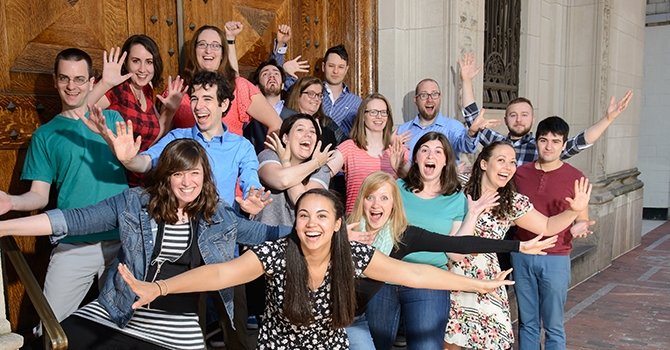How to Improv Your Life

Listen. Work as a team. Don’t block others. Make active choices.
These are some of the principal tenets of improvisational comedy—but they’re lessons that, if properly applied, can work off the stage as well.
Stephen Yenke ’12 and Dan Russell ’03 are two members of Sea Tea Improv, based in Hartford. They’ve grown from a seven-member troupe into a full-blown company building their own black-box theater downtown. Here, they help us set the scene: How they got into improv, and how you can, too.
What was your experience at UConn like? How did you get involved in improv while there?
Stephen Yenke ’12: In my freshman year at UConn, I was looking for student organizations to join and I started going to the general meetings of the Agents of Improv. It would be a weekly 2.5 hour open rehearsal with 40 people and it was great fun. It became one of my main extracurricular activities. By my senior year, I was the Master of Cermonies of Agents, and the UConn improv community had grown to include two new troupes, Horse Lincoln and Reckless Gents.
Dan Russell ’03: I didn’t do improv until after college. I don’t even know if there were groups at UConn when I was there—I was totally oblivious to it. I did watch lot of Comedy Central in my dorm in Towers my freshman year, including the Upright Citizens Brigade when it was first airing, and a ton of Saturday Night Live reruns. We had a tight group of friends in Towers that I still have today that did a lot together, so I didn’t get involved much in other campus groups or activities, which I kind of regret. The few things I did do, like go to slam poetry shows and concerts, definitely made me want to be some kind of performer, even though I was too shy to even try anything like that in my college years. I met someone at UConn in my last few years there who did improv in Chicago, and that was the first time it really clicked with me that improv was a thing people did and anyone could do.
What do you enjoy about improv? How is it different from stand-up or sketch comedy?
SY: Stand-up and sketch are great, but they are mostly planned and scripted ahead of time, usually written by multiple people. Improv comedy is fun because you’re making it up in the moment, and the artistic collaboration is happening live.
DR: A few years after college, I knew I wanted to do some kind of comedy performance. I went to a ton of stand-up comedy shows and open mics, just taking it all in. I listened to so many stand-up albums, and I wished I could be an intellectual comic like David Cross or Patton Oswalt. I hoped to go up one day at an open mic, but for all my trying, I could never manage to write a single joke. I don’t know if I really had a strong comedic voice or point of view. I still don’t know if I have that. To try to find my voice, so I could maybe write something someday, I signed up for an improv class. I loved that I was creating comedy, living in the moment, without having to force some idea out of my head that just wasn’t there. It wasn’t just me in any scene. I had a scene partner there who was working too. If we each had a half-idea, we could see what happened when they came together and we built together from there.
The best part of improv, for me, by far, is the collaboration, and a close second is the satisfaction of making something truly funny out of almost nothing.
Sea Tea Improv has been a key part of a growing arts and comedy scene in Hartford. How did your group form as part of this growth, and what is your view of Hartford’s arts and entertainment scene—both now and in the near future?
SY: Hartford is already a great place for theater. In fact, the original seven founders of Sea Tea Improv met each other in an improv class at the Hartford Stage. Hartford gave Sea Tea Improv the room to grow from seven people to an award-winning professional comedy company, about to open up a 75-seat black box theater. Since Hartford is already a destination for live performances, Sea Tea Improv just wants to add to that with a dedicated comedy space. DR: Sea Tea Improv is definitely a product of Hartford arts just as much as we’re a contributor to it. The founding members really got together taking improv classes at Hartford Stage. We wouldn’t be where we are now if stages like City Steam’s comedy club, the Funny Bone, and Hartbeat Ensemble’s Carriage House Theater didn’t take a chance to put us on. We wouldn’t have the same great studios without a property owner like Jonathan Cohen going out of his way to support artists.
The Hartford arts scene is growing, and our very own comedy theater is going to be adding to that growth. We think the Sea Tea Comedy Theater will be an important addition to Hartford, which already has a few traditional theaters. We’ll be offering live comedy shows—improv, sketch, stand-up, and more —for about the price of a movie. We’re adding a whole new kind of thing that has a chance to really compliment everything else that Hartford arts and entertainment has going on right now. More people are living downtown now, CT Fastrak makes the whole area feel more like part of the city, UConn’s Hartford branch is moving downtown—all things that look like they’ll make seeing and performing art and comedy in Hartford really great.
What aspects or tenets of improv comedy can be applied elsewhere in life? How has performing changed your approach to the workplace or to new experiences generally?
SY: One aspect of improv comedy is listening. This includes not only remembering what people said, but also picking up on what they are not saying. People can say a lot with body language and facial expressions.
DR: The way improv teaches you just how important listening and being willing to collaborate are to success will really change your life. In the workplace, in your relationships, in your whole approach to the world, you are missing out on so much if you aren’t hearing what others are saying, taking it in, letting it affect you, and being willing to then truly work with that person. When you have these improv skills at your disposal, so much seems easier.
If this sounds like the promise of a cult leader, that’s because it is. Please come join my improv cult. We have classes and shows all the time. You’ll find people just like you, and probably find yourself too.
I don’t even know if I’m joking about the cult thing.
Say I want to try my hand at improv comedy. Where should I go? Any resources you’d recommend?
SY: If you’re interested in doing improv comedy, I would recommend visiting Sea Tea Improv Studios in downtown Hartford. Sea Tea offers improv classes and workshops for beginner, intermediate, and advanced improvisers. There are also weekly and monthly drop-in jams.
DR: Luckily, improv is booming right now, and it’s happening at most colleges and in every decent sized-city. Go to a show. Go online and do a search for improv near you. Improv comedians, by law, must constantly post on social media about their upcoming shows. Find one, and just talk to the performers after the show. Chances are, they will absolutely love talking to you about improv. They can tell you if their group teaches classes, or ever has auditions, or if there are events where anyone can join in. See one show, and you’ll probably know if you want to be up on that stage. Even if you don’t want to be a performer someday, take a class or workshop as soon as possible. You’ll probably love it. They’re usually low-pressure and fun. For Connecticut residents, especially those in the Hartford area, I’d recommend joining the “Connecticut Improv” group on Facebook and following @CTimprov on Twitter. You’ll find out about a ton of improv shows, classes, and events going on all the time.
